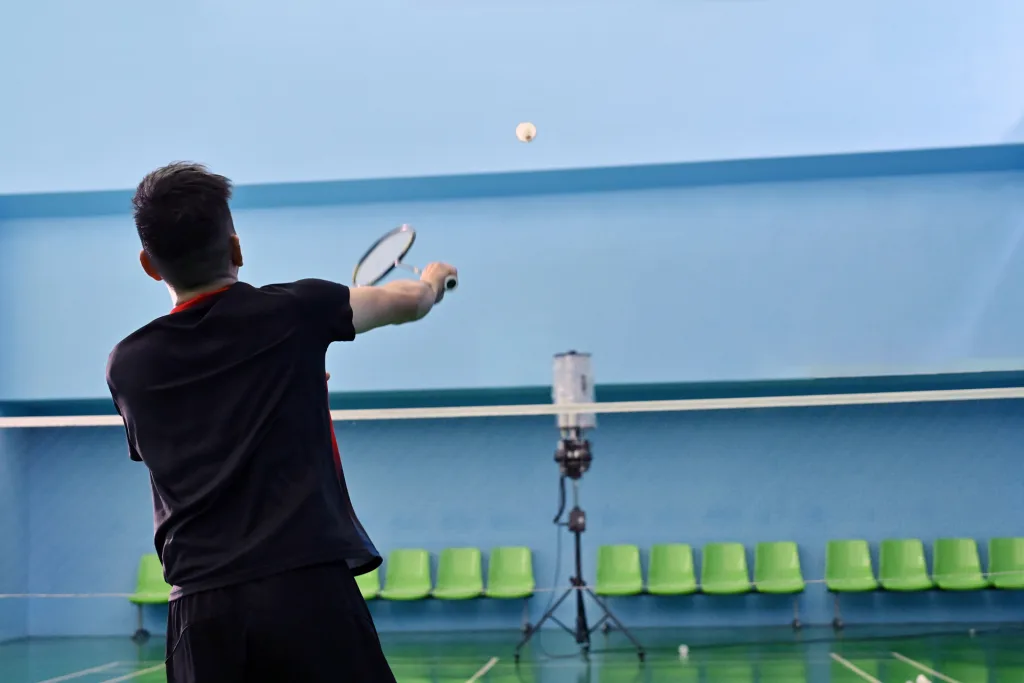I am not what you would call a finely tuned athletic machine. I am, if anything, an outdated lawnmower engine held together by duct tape and rust. So when I was offered the opportunity to let AI help make me a better athlete at CES, I jumped at the opportunity.
The offer came from the Industrial Technology Research Institute (ITRI), a non-profit that uses applied research to drive industrial development. They were showing off a new AI-driven trainer that uses image analysis and data inference to improve an athlete’s performance. The sport that was the focus of this particular demonstration? Badminton.
The upside, I thought, would be that no one at CES would be especially good at badminton—so it wouldn’t be as humbling as it would if the system was tracking, say, my golf swing. Then Howard Shu strolled by.
Shu is a member of the U. S. Olympic badminton team and has been playing the sport for 26 years. He’s tall, in remarkable shape, and knows how to make a shuttlecock do pretty much whatever he wants. He is, in other words, the antithesis of me. We’ll get back to him in a moment, though.

To get a sense of my abilities, the training tool used a series of cameras to track my stance, swing, and other movements over five volleys. The data was fed into a Generative AI system, which instantly offered recommendations. At the same time, information like the speed of my volleys, the height with which they cleared the net, and where they landed on the court was captured and factored in as well.
I thought I was doing okay, honestly. I whacked the shuttlecock at 52 miles per hour, cleared the net by two feet, and made my invisible opponent chase it around the court. Then I walked over to see what the AI had to say.
“Ah, my friend!,” it wrote. “It looks like we’ve got a bit of a situation here.”
Maybe I hadn’t done quite as well as I thought I had.
The AI (which called itself Bill) noted that I was standing too close to the shuttlecock, which limited my ability to reach for the shot. Also, I needed to work on my weight transfer and balance. My footwork was not exactly ideal either.
And while it had my attention, Bill noted that my grip on the racket “might not be ideal for controlling the shuttlecock effectively or generating power” with my shots. And my follow-through was “abrupt.”
Basically, the machine told me, I suck.
That’s when Shu took a turn. His speeds were closer to 80 mph—and he tightly grouped the shots. (He later told me he felt the system’s speed detection needed some calibrating as he normally hits faster than that.)
I gave the system one more try, with Shu suggesting I stand in a different spot on the court—and while my shots weren’t as powerful, they were much more tightly grouped. I won’t be threatening Shu’s spot on the Olympic team anytime soon, but I could be more of a beast at the local recreation center.

This training tool is already used by the Taiwan Olympic badminton team, an ITRI representative told me. Shu said it was the first time he had had an opportunity to try it—adding that he expects a growing number of athletes will begin to incorporate AI into their training.
“It’s able to pick up things you’re not able to pick up with the naked eye,” he said. “I can tell you my smash is fast, but I’m not going to be able to tell you the exact speed. You’re able to dial in exact numbers and get data driven results. As high performing athletes, we’re always trying to find that 1% advantage.”
Bill, I should note, remained unimpressed with my performance on the court.
Shu might be looking for a 1% advantage. I’d settle for the AI being a bit less judgmental.
Login to add comment
Other posts in this group

Imagine you invest $500 to help a startup get off the ground through investment crowdfunding. The pitch is slick, the platform feels

A perfect storm is brewing for reading.
AI arrived as both


While Sam Altman, Elon Musk, and other AI industry leaders can’t stop

A senior lawyer in Australia has apologized to a judge for


Ever wondered what goes on behind the scenes in a modern airliner’s cockpit? While you’re enjoying your in-flight movie, a quiet technological revolution is underway, one that’s
